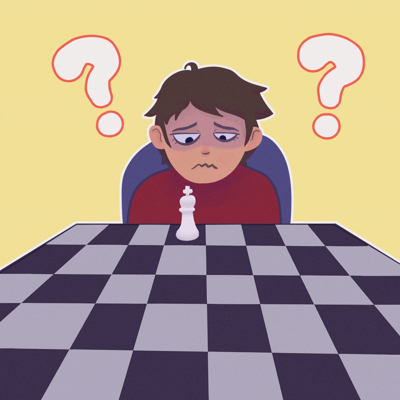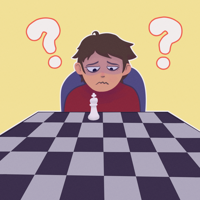
If a TV show or movie wants to demonstrate its character’s intelligence, they show the character playing chess, often playing brilliant moves very quickly or playing a ridiculously long opening sequence from memory. The belief that chess is the domain of the intellectual is ingrained in our culture.
But the truth is people from all walks of life play chess, many attaining mastery, while some brilliant people enjoy playing but never progress beyond beginner. The ideas that chess is only for geniuses or that a player must memorize opening moves to succeed are myths that should be rejected.
Whether a chess player’s skill reflects more on their intellect or hard work and practice comes down to the age-old question of nature versus nurture, and the answer in this case is not clear-cut.
There have been scientific studies by Michigan State University and Rice University supporting the idea that the primary factor to determine chess skill is intelligence. Conversely, a study by Florida State University shows that the amount of practice and experience is the most important factor. While this may be an interesting topic for study and debate, the distinction is unimportant.
Everyone starts from the same point, with learning how the pieces move, and while players develop at different paces, everyone can build their chess skill. Regardless of a person’s intelligence, anyone can dramatically improve with practice.
Anyone can play and enjoy the game of chess. The idea that chess requires high intelligence comes across as nonsensical as saying speed is needed to run, or strength is mandatory to lift weights.
Over one million people in the world run a marathon every year. The average finish time in the 2018 global marathon was 4:29:53 (four hours, 29 minutes and 53 seconds). To qualify for running the marathon in the Olympics, runners must achieve the entry standard of 2:11:30 for men or 2:29:30 for women.
The majority of marathon runners will never come close to qualifying for the Olympics, but this doesn’t stop people. People run marathons for exercise, fun and the satisfaction of improving a skill over time. This notion holds for chess. People play chess to give their brain exercise, have fun and experience the reward of developing and improving a skill over time.
New chess players sometimes spend time memorizing sequences of opening moves. However, the chances of a game playing into any specific line are so small that spending time studying it is often a waste. Most chess tutors will recommend against studying openings and instead suggest focusing on tactics.
Tactics are short-term sequences of moves resulting in some type of gain, such as winning a pawn or piece. Any player can get better at tactics through practice by simply playing the game of chess. Opening knowledge is only useful in the opening and becomes useless if the opponent makes an unexpected move, but tactics are helpful in every phase of the game. Most players know very little opening theory — if any at all.
Playing chess improves academic performance in younger people, increases confidence and self-esteem and could act as a protective factor against dementia for older people, according to studies by worldwide scientists.
If UTA students would like to join the millions of people who play and enjoy chess, a great place to start is to come to a Maverick Chess Club meeting. Playing chess has many benefits, and it’s fun!



Post a comment as anonymous
Report
Watch this discussion.
(0) comments
Welcome to the discussion.
Log In
Keep it Clean. Please avoid obscene, vulgar, lewd, racist or sexually-oriented language.
PLEASE TURN OFF YOUR CAPS LOCK.
Don't Threaten. Threats of harming another person will not be tolerated.
Be Truthful. Don't knowingly lie about anyone or anything.
Be Nice. No racism, sexism or any sort of -ism that is degrading to another person.
Be Proactive. Use the 'Report' link on each comment to let us know of abusive posts.
Share with Us. We'd love to hear eyewitness accounts, the history behind an article.